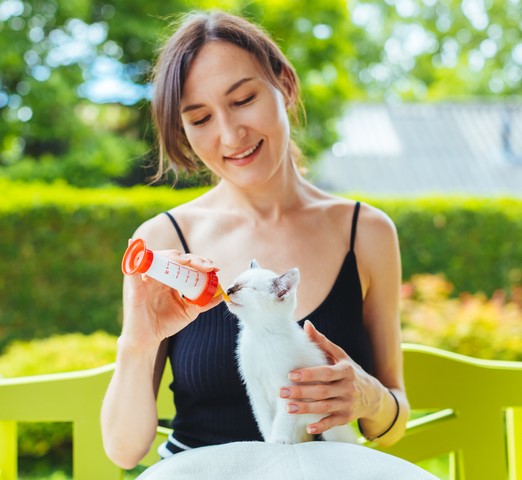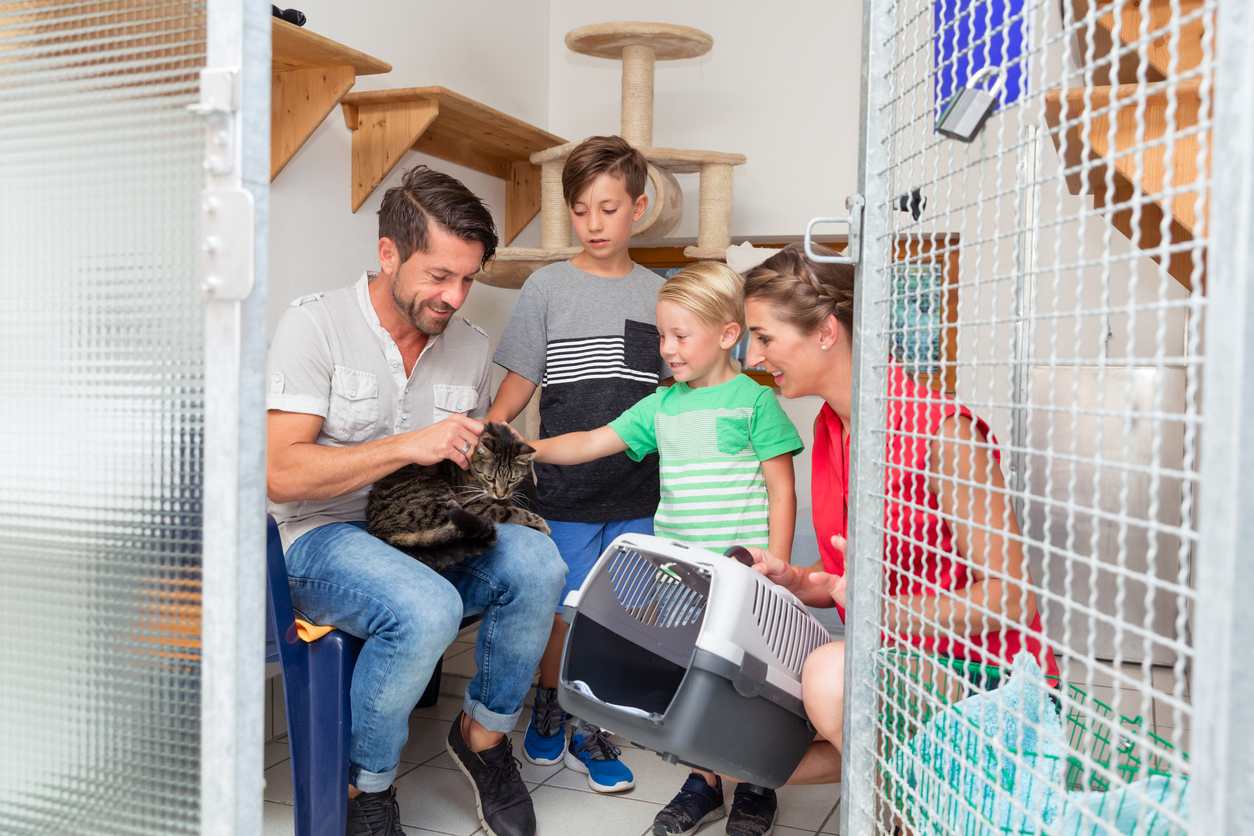Ways You Can Volunteer to Help Kittens and Cats
You might be thinking about fostering a cat or a litter of kittens (we’ll talk more about that below), but the best way to get started is to volunteer at your local shelter or rescue. Each group will have guidelines for who they accept as a cat foster parent, and by volunteering at the shelter you’ll get great experience to meet those criteria and help the shelter cats and kittens at the same time.
When you volunteer to work with cats at the shelter, you may be asked to do any or all of the following important duties:
- Assisting with feeding and watering
- Brushing cats
- Changing litter pans and bedding
- Playing with, petting, or helping to socialize cats
- Assisting with cats recovering from surgery
- Cleaning cages and adoption rooms
- Washing dishes or doing laundry
- Sitting quietly in rooms with feral or shy cats to help them get acclimated
- Assisting with paperwork, filing, or other office work
- Help potential adopters learn more about cats and get to know ones available for adoption
What Does it Mean to Foster a Cat or Kitten?

“Kitten season” each spring means that cat shelters and rescues are inundated with kittens that can’t be adopted until they are 8 weeks old. Often shelters do not have enough room or resources for so many kittens, especially young ones that require bottle feeding or cats that do not adapt well to shelter life. Shelters and rescues rely on volunteers and kitty foster parents to provide temporary care for this influx of new cat babies and to help as many as possible get adopted.
Fostering a cat or kitten (or both) means bringing them into your home and taking care of them for a period of 1 to 8 weeks until they are ready to adopted. You may even help find a furever family for your kitten brood. You’ll feed, clean, and provide safety and shelter for a single cat, a mom with kittens, or a litter of kittens from 1-8 weeks of age.
Depending on how young the kittens are and how experienced you are as foster parent, you may need to bottle feed, which is a big responsibility that requires training and being available every 2-3 hours around the clock until the kittens wean at about 4 weeks old.
Every shelter or rescue has different guidelines for what is required to become a cat foster parent, so you’ll want to check with your local community to see what is needed. Typically, you need a separate place for the fostered cats that is kitten-proofed and away from other animals. It’ll need to be stocked with appropriate food, water, and warm places to sleep. And you need to love cats!
Volunteering with Senior Cats at Shelters or Rescues
When you think about fostering, you often think about kittens, but did you know that adult and senior cats also benefit from fostering, sometimes even more so? Kittens are adorable and easier to get adopted. Once a cat moves out of kitten stage, it’s statistically more difficult for them to get adopted from a shelter, especially after they hit the “senior” age of 10 years old or more. However, even senior cats have years of love left to give and they are often purrfect companions for many folks who would rather not deal with the kitten crazies.
Why mature cats need fostering or socializing:
- Many adult cats that come into rescues or shelters may be recovering from surgery for spay/neuter or for an injury. They need the love and care from foster parents while they’re convalescing so they can heal better and gain the trust of humans.
- Adult or senior cats in shelters may have been feral, and need to learn that humans are friends and being indoors are safe spaces. Fostering is the best way to give adult cats the space they need to adjust and feel comfortable.
- A lot of senior cats have had homes before, but were separated from their first family either by the death of their human, a human family member’s medical condition, or just getting lost and not reunited. They often do not thrive in shelter life, and do much better in homes. Happier, more adjusted kitties get adopted more frequently!
- Some senior cats may have chronic medical conditions that require medication and monitoring – and are perfect for fostering vs. shelter life as a result.
- They tend to take longer to adopt than kittens and younger cats, so you’re helping those in the most need find the love and stability they deserve!
Benefits of Volunteering with or Adopting a Senior Cat:
Older cats have more set personalities, so you truly know what you’re getting when you adopt a mature kitty. By volunteering with senior cats or fostering them, you help get to know that personality so you can communicate how wonderful they are to potential adopters.
For example, you’ll get to learn whether a particular mature cat is more playful, mischievous, lovey-dovey, talkative and you’ll get to see how they do around other pets and various humans. All of this is great information to help families looking to adopt decide whether kitty is right for them.
Mature cats tend to be more laid-back than kittens or young adults, so if you’re not sure that you have the patience for the energy and potential destructiveness of kittens, working with and fostering a senior kitty may be just your speed.
Of course, fostering cats helps them survive and thrive, but it also helps you! What do you get? A chance to get to know a kitten or cat in your home environment before committing to adopting, a way to have a temporary pet if having a permanent one is too difficult given your work or travel schedule, and enjoying the cute, melt-your-heart kitten stage again and again with new litters. Although in most cases, you’ll need to say goodbye to each cuddly cat or kitten as they are adopted, some volunteers and foster cat parents end up with a permanent family member after the foster period, too.
How to Get Started Fostering Kittens or Cats
If you’re ready to start fostering a cat or kittens, contact your local shelter or rescue or find a program by entering your ZIP code at FelineGenerous.com. You’ll probably have to come in for an interview, and you may be required to volunteer at the shelter, attend a training program, and/or have your home inspected to be sure it is safe and appropriate for fostering 1 or more cats or kittens. These guidelines vary for each shelter, but they’re in place to ensure a good fit for you and a healthy, safe environment for the cats. Soon you’ll be well on your way toward welcoming foster cats into your home.
Before the foster cats arrive in your home, make sure you have the following ready:
- A kitten-proof space to keep them, at least at first. Bathrooms are easier to cat-proof and clean, plus the smaller space can help them feel more safe and be easier for you to manage interaction time.
- A heating pad covered by a towel to help keep them warm
- Other snuggly spaces to curl up that are not heated
- For kittens 4-8 weeks old, a small container of litter recommended by the shelter. For adult cats, a regular sized litter box and any type of litter you and the cat prefer.
- Dangle toys and other toys to interact with the cats for playtime
- Fleacomb or brush
- Time to devote to your foster furbabies while they are with you
- A camera to take cute pics and vids you can send to the shelter to help them find a family to adopt each cat or kitten
- Patience and love. Remember that most shelter animals have had a tough time before they got to the shelter and some even have trauma from shelter life. But you’re here to show kitty that humans are wonderful companions who can be trusted, a process that begins from your first interactions and lasts throughout the foster period.
Other Ways You Can Help Cats, Shelters & Rescues
Not everyone can foster kittens or cats, even when they want to. That doesn’t mean you can’t help feral cats or newborn kittens live safe, healthy lives. Instead of fostering, try one of other ways to help your local shelter or rescue. We know they’ll appreciate it!
- Donate cat litter, food, or supplies to your local shelter.These are used in-house at the shelter and provided to people fostering cats or kittens. Ask your shelter what type of litter they prefer.
- Set up an auto-shipment to have litter, supplies, or toys delivered monthly to a shelter you choose anywhere in the country.
- Support your local shelter with a monthly or annual cash donation.
- Volunteer at the shelter to help care for and socialize cats and kittens.
- Inform your local rescue of any feral cats or kittens you noticeso they can help them.
- Talk to your friends about how awesome it is to be a kitty parent and how they can find the purrfect feline friend of any age and temperament.
- Visit ARM & HAMMER™ Feline Generous partnership with the ASPCA for more ways to help shelter cats near you, especially those that often get overlooked due to age, appearance or even a misunderstood purr-sonality. Check back often for contests, new shelter partners, and ideas for how to help cats in need in your zip code and around the country.


